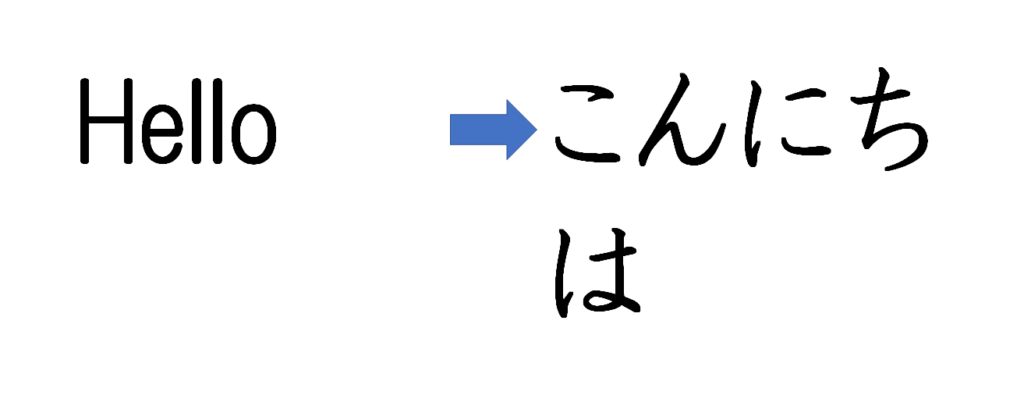
(道具・手段)で Vます
V with (tools / means)
文型-1
Sentence style-1

わたしは お箸で ごはんを 食べます。
I eat with chopsticks.
わたしは ナイフと フォークで ごはんを 食べます。
I eat with a knife and fork.
わたしは 手で ごはんを 食べます。
I eat meals by hand.
「<道具・手段>でVます」 ⇒ 助詞「で」は 手段や 方法を 表す。
V with (tools / means) ⇒ The particle “de” represents a means or method.
5課では「<交通手段>で」を学習したが、 ここでは <道具>でを 学習する。
In lesson 5, we learned “by ” (transportation), but here we will introduce “by ” (tool).
例文-1
Example-1

そのニュースを 何で 知りましたか。
How did you know the news?
テレビで そのニュースを 知りました。
I knew the news on TV.

新聞で そのニュースを 知りました。
I knew the news in the newspaper.
絵で導入・絵で練習の目次3
「で(手段・道具)」もいっしょに読みたい。
(言語)でVます
V in (language)
例文-2
Example-2

日本語で スピーチを しますか。
Would you like to give a speech in Japanese?
いいえ、 英語で スピーチします。
No, I will give a speech in English.
<言語(日本語、英語等)>でVます。
Verb in (Language(Japanese, English, etc.)).
~は(言語)で~です
~ is in (language) ~
例文-3
Example-3

“Good morning”は 日本語で 何ですか。 What is “Good morning” in Japanese?
・・・ 「おはようございます」 です。 “Ohayou gozaimasu”

Hello”は 日本語で 何ですか。
What is “Hello” in Japanese?
・・・「こんにちは」です。
“Konnichiwa”
~は<言語>で~です。
~ is ~ in (Language).
わたしは(人)に(物)をあげます
I give (things) to (people).
文型-2
Sentence style-2

わたしは チョコレートを あげます。
I’ll give chocolate.
誰にあげますか。
Who will you give it to?S1さんに あげます。
わたしはチョコレートをS1さんにあげます。
I will give chocolate to S1.
「わたしは<人>にNをあげます」 ⇒
I give (things) to (person).
行為が向けられた<人>には助詞「に」をつける。
The particle “ni” is added to the to which the act is directed.
「<人>に Vます」 Verb to (people).

かきます write
わたしは 母に 手紙を 書きます。 I write a letter to my mother.

かけます call
友達に 電話を かけます。 I make a phone call to a friend.

送ります send
佐藤さんに メールを 送ります。 I will send an email to Mr. Sato.

貸します lend
サントスさんに 本を 貸します。 I will lend you a book to Santos.

教えます teach
学生に 勉強を 教えます。 I will teach students to study.
例文-4
Example-4

だれにクリスマスプレゼントを送りますか。
Who do you send Christmas gifts to?
・・・ 子どもたちに送ります。
I will send it to the children.
わたしは(人)に(物)をもらいました
I got (things) from (person).
文型-3
Sentence style-3

今日は 私の 誕生日です。
Today is my birthday.
わたしは プレゼントを もらいました。
I got a present.
友達に プレゼントを もらいました。
I got a present from a friend.
わたしは 友達に プレゼントを 貰いました。
「わたしは<人>にNをもらいました」 ⇒ 「もらいます」「かります」「習います」
などの 動詞は 動作を 受ける ほうからの 表現です。
“I got N from (a person)”.
⇒ Verbs such as “get”, “lend”, and “learn” are expressions from the person who receives the action.
例文-5
Example-5

その手帳と 万年筆、 素敵ですね。
The notebook and fountain pen are wonderful.
ええ、父にもらいました。
Yes, I got them from my father.
もうVました
I got it.
文型-4
Sentence style-4

教師が 一人3役で行う。
Teacher plays 3 roles.
今日は レポートの 締め切りです。
Today is the deadline for the report.
レポートは 出しましたか。
Did you submit a report?
S1: ・・・ はい、 わたしは レポートを 提出しました。
Yes, I submitted the report.
S2・・・ いいえ、 わたしは まだです。
No, I haven’t.
「もうVました」⇒ 行為や 物事が 完了していると いう 意味で 使われる。
I got it. ⇒It means that an act or thing is completed.
肯定は「もうVました」、否定は「まだです」
The answer to this is that the positive form takes “already done”. Negative form takes “not yet”.
例文-6
Example-6

来週 歌舞伎を 見ます。
I will see Kabuki next week.
そうですか。 もう チケットは 買いましたか。
Is that so. Have you bought a ticket?
はい、 もう 買いました。
Yes, I have already bought it.
例文-7
Example-7

もう あの映画は 見ましたか。
Have you seen that movie?
・・・ いいえ、 見ませんでした。
No, I didn’t see it.
見ませんでした。違います。いいえ、まだです。
I did not see it. It’s wrong.
絵で導入・絵で練習の目次6
「もう・まだ」にいっしょに読みたい。
ことばを覚えよう。

漢字の練習をしよう。

文の形を覚えよう

耳で覚えよう。

日本語教師 教師用教案


コメント